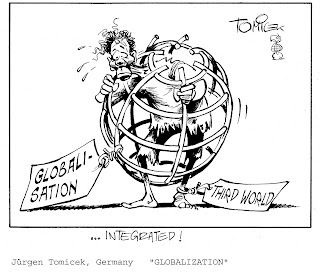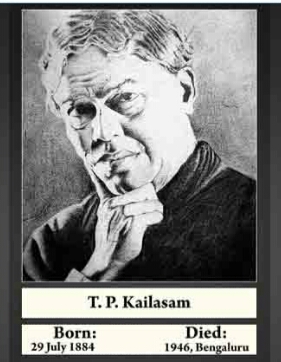This Blog post is a response to the thinking activity on the topic, 'Future of Postcolonial Studies' - a task given by our Prof. Dr.Dilip Barad Sir. To know more about this task, CLICK HERE.
About Ania Loomba:
Globalization :
She described globalization in the future of postcolonial studies. Certain violent events like 11 September 2011 can be mentioned as Global War and become part of Globalization. As we know that for many years, America becomes popular as a Capitalist country. Because it is fresh grounds for examining the relevant postcolonial perspectives to the world we now inhabit. It is not be analyzed using concepts like margins and centers so central to postcolonial studies. She further clarified that Today's economies, politics, cultures, and identities are all better described in terms of transnational networks, regional and international flows, and the dissolution of geographic and cultural borders, paradigms that are familiar to postcolonial critics but which are now invoked to suggest a radical break with the narratives of colonization and anti-colonialism.
Some references she used like Michael Hardt and Antonio Negri's "Empire" argue that the contemporary global order has produced a new form of sovereignty that should be called 'Empire' but which is understood in contrast to European empires. The Empire is not the center of power but is decentered and deterritorializing apparatus of rule within its open, expanding frontiers. They allow hybrid identities in the country and that's why it becomes Empire and then Imperial. Then Hardt and Negri argue that Empire is through the global expansion of the internal US constitutional project - which sought to include and incorporate minorities into the mainstream rather than simply expels or exclude them which further absorbs them into a new international network.
Empire can only be conceived of as a universal republic, a network of powers and counterpowers structured in a boundless and inclusive architecture. This imperial expansion has nothing to do with imperialism, nor with those state organisms designed for conquest, pillage, genocide, colonization, and slavery. Against such imperialism, Empire expands and consolidates the model of network power. Certainly, the expansive moments of the Empire have been bathed in tears and blood, but this ignoble history does not negate the difference between the two concepts.
As Susie O'Brien and Imre Szeman believe that they celebrate Empire as -
- exceptionally helpful in advancing our capacity to think past the reinscription of globalization as a center/periphery dynamic
- that produces resistant margins and hegemonic cores. (postcolonial studies from being able to analyze the operation of contemporary power.)
Tim Brennan noted that Empires in the colonized of today are given a little place in the book's sprawling thesis about multitudes, biopolitical control, and the creation of alternative values. Further, the article claims the incident of 11 September 2001 and Lisa Lampett's idea about the rhetoric of the 'clash of civilizations and medieval anti-Semitism and Islamophobia. Contemporary views of cultural difference mirror past and present geo-political tension and rivalries.
These both modes of being are seen as differently incommensurate with the Western world:
Muslims - as barbaric and given to acts of violence, (despotic and intractable)
Asians - as diligent but attached to their own rules of business and family (inscrutable and hard working)
P. Sainath observes, far from fostering ideological openness, has resulted in its own fundamentalism, which then catalyzes others in reaction:
Market fundamentalism destroys more human lives than any other simply because it cuts across all national, cultural, geographic, religious, and other boundaries. It's as much at home in Moscow as in Mumbai or Minnesota. A South Africa - whose advances in the early 1990s thrilled the world moved swiftly from apartheid to neoliberalism. It sits as easily in Hindu, Islamic, or Christian societies. And it contributes angry, despairing recruits to the armies of all religious fundamentalisms. Based on the premise that the market is the solution to all the problems of the human race, it is, too, a very religious fundamentalism. It has its own Gospel: The Gospel of St. Growth, of St. Choice...
Indian research group argued that how the actual measures carried on under globalization.....were the processes of imposition, disintegration, underdevelopment, and appropriation. Concludes that it is 'far from becoming more integrated and prosperous, the world economy is today even more starkly divided.' that is why the third world's labor force is unemployed or underemployed. The new empire doing such things to apply this kind of theory that they facilitate global connection and create new opportunities, and entrench disparities and new divisions.
The New York Times speaks on a huge demonstration in La Paz which defined military barricades to protest a plan to export natural gas to the United States:
'Globalization is just another name for submission and domination, Nicanor Apaza, 46, an unemployed miner, said at a demonstration this week in which Indian women.... carried banners denouncing the International Monetary Fund and demanding the president's resignation. 'We've had to live with that here for 500 years, and now we want to be our own masters.
Bolivia is one of the first Latin American countries to which is open itself to a modern global economy. Bolivia embraced the free-market model. It is imposed by World Bank and the INF (International Monetary Fund) used the phrase 'market fundamentalism' in his critique of globalization. Joseph E. Stiglitz, Nobel Laureate and once Chief Economist at World Bank also used this phrase. World Bank and IMF imposed it like have been disadvantageous to developing countries, especially the poor within those countries.
Modern empires are being widely whitewashed. Thus, David Cannadine's Ornamentalism questioned that, belief that there was no racism in the British Empire. George W. Bush also claims that the US freed Filipinos instead of colonizing them. Such whitewashing also directly attacks it.
What makes confused the people is that the US acts as an imperial power not as a function of its own motives but in the name of global rights. This type of self-promotion of US leaders with the actual dynamics of US military power today. The US presents simultaneously ultra-nationalist and imperialist.
David Cannadine's Ornamentalism asks us to believe that there was no racism in the British Empire. Thus too George W. Bush now claims that the United States freed Filipinos instead of colonizing them. Such whitewashing not only obscures, distorts, and ignores anti-colonial and post-colonial scholarship but also directly attacks it.
The policy 'mix' favored by Victorian imperialists reads like something just published by the International Monetary Fund, if not the World Bank: free trade, balanced budgets, sound money, the common law, incorrupil administration and investment in infrastructure financed by international loans. These are precisely the things the world needs right now.
American Council of Trustees and Alumni (ACTA) suggests that universities are not up to this task because, unlike the rest of the country, large numbers of American academics and students are critical of US policies. On US campuses, it has become commonplace to suggest that Western civilization is the primary source of the world's ills even though it gave us the ideals of democracy, human rights, individual liberty, and mutual tolerance After 9/11, the report went on to complain, instead of ensuring that students understand the unique contributions of America and Western civilization the civilization under attack-universities are rushing to add courses on Islamic and Asian cultures.
The core premise of post-colonial theory is that it is immoral for a scholar to put his knowledge of foreign languages and Cultures at the service of American power. In fact, one of Edward Said's most valuable achievements in Orientalism was not simply to establish the connection between scholarship and state power in the colonial period, but to indicate its afterlife in a 'post-colonial global formation with the US at its epicenter. If universities are to remain sites of dissent and free intellectual inquiry, if the scholarship is not to be at the service of America or any other power, critiques of past and ongoing empires are going to be more necessary than ever.










.jpg)


